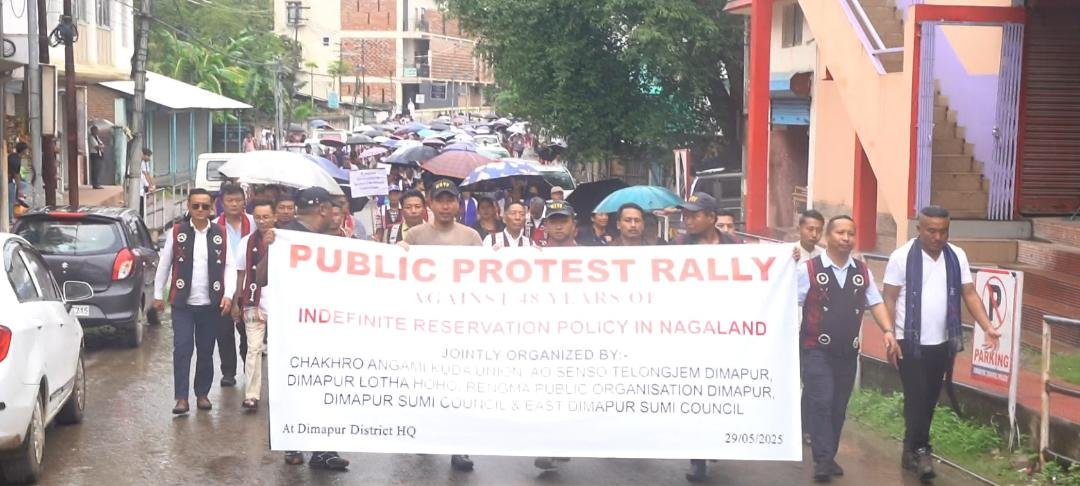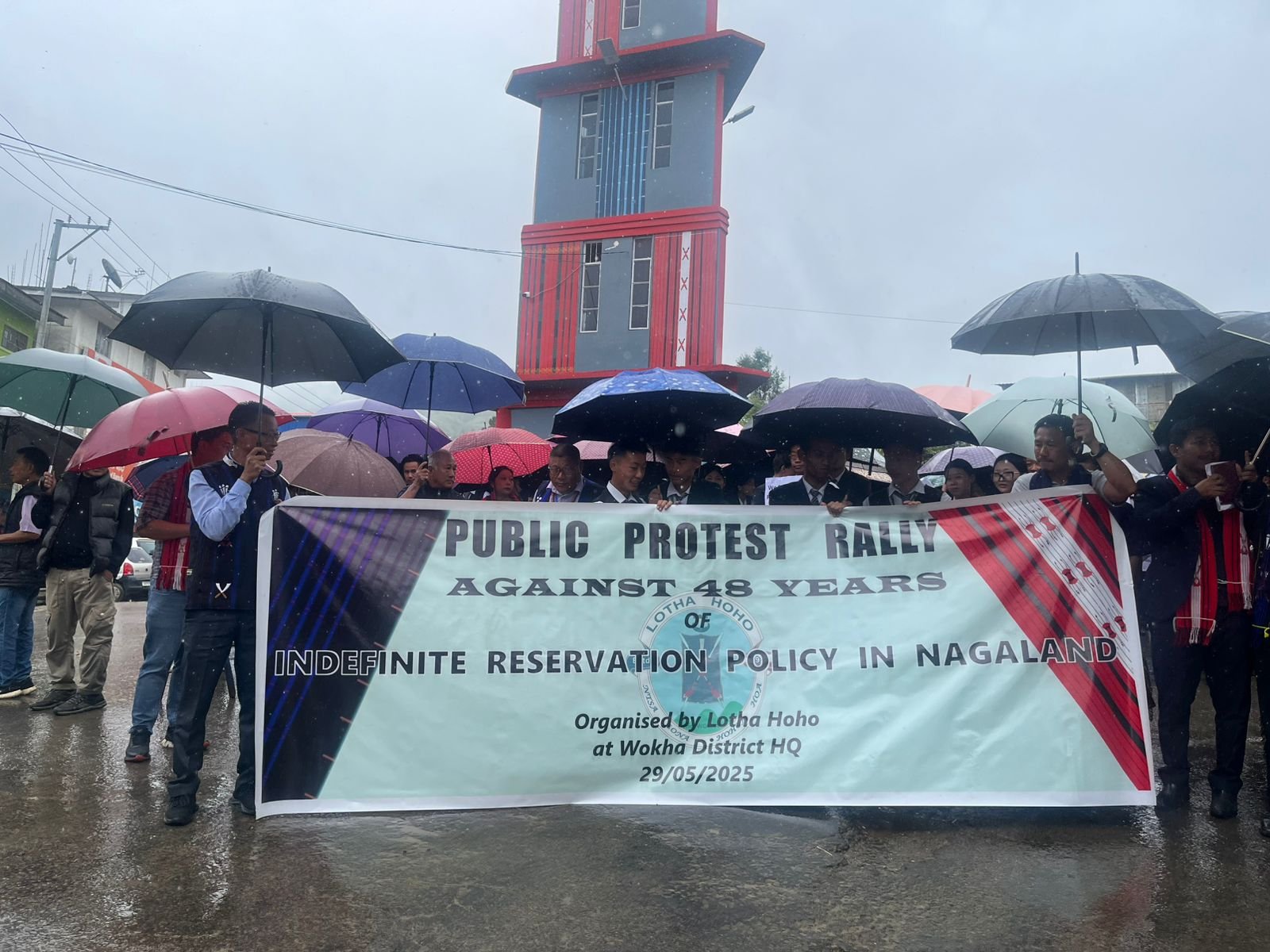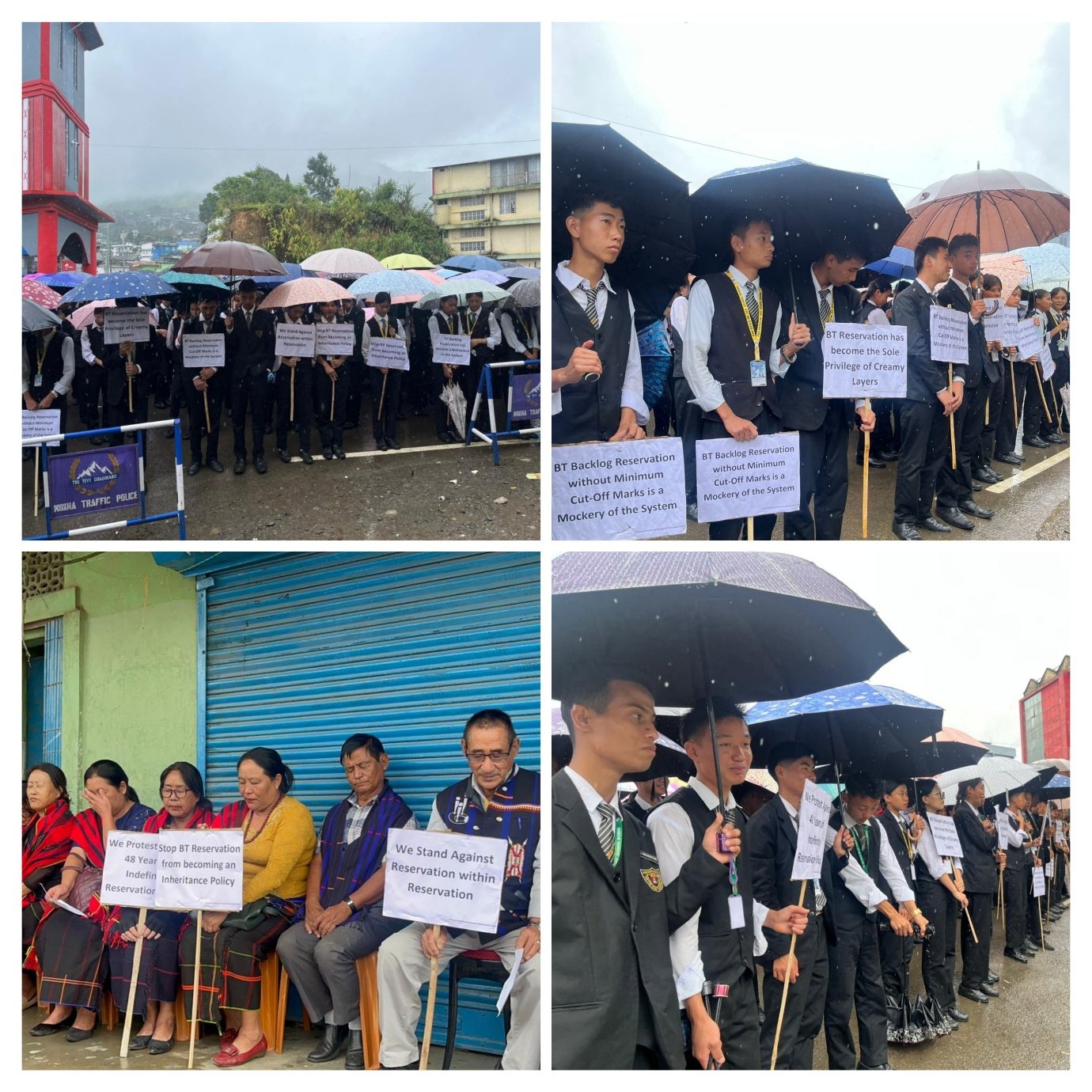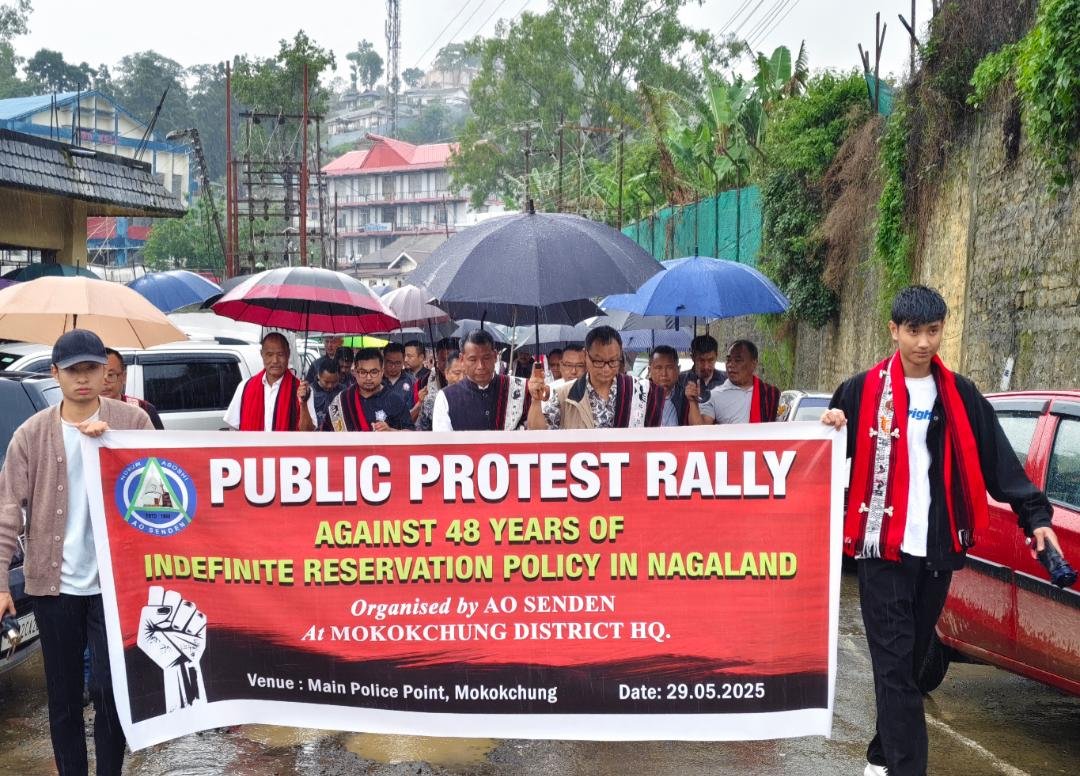In a historic and peaceful demonstration, thousands of citizens across Nagaland participated in a coordinated state-wide peace rally on May 29, led by the 5 Tribes Committee on Review of Reservation Policy (CoRRP). The protest, held simultaneously across eight districts Dimapur, Kohima, Mokokchung, Wokha, Tseminyu, Zunheboto, Chümoukedima, and Niuland, marked the first phase of a growing movement demanding the review or reform of Nagaland’s 48-year old reservation policy.
The rally was organized by apex tribal bodies of five Naga tribes Angami Public Organisation, Ao Senden, Lotha Hoho, Rengma Hoho, and Sumi Hoho who have united under CoRRP to seek what they describe as justice, fairness, and equal opportunity in public employment and education.

Dimapur : Reservation often creates disparity at the stage of employment
In Dimapur, the rally began at the DC Court Junction with hundreds of citizens braving the rain. Following a short program, a procession moved to the office of Deputy Commissioner Dr. Tinojogshi Chang, where a memorandum was submitted.
Delivering the keynote, CoRRP Member Secretary Capt. GK Zhimomi detailed the rationale behind the protest. He criticized the continued implementation of a reservation system introduced in 1977, originally meant for 10 years, but still enforced nearly five decades later without comprehensive review.
Zhimomi stated that what began as 25% reservation has increased to 41% and none of the seven review committees ever consulted non-backward tribes, accusing the system of reinforcing inequality by excluding the so-called ‘advanced’ tribes from the discourse and benefits.
Zhimomi recalled that in 2016, five student organizations from the participating tribes submitted a six-point charter of demands to the state government, which included: Implementation of the creamy layer concept, Reservation by geographical pocket, Uniform educational qualification standards, Cut-off marks for competitive exams and Fixed time frame for reviews.
He said that despite a Cabinet Sub-Committee formed in 2022, no resolution was reached, with the government stating that no review could happen until after the next census.
He also revealed that the government sent a letter dated May 25, mentioning a review committee was constituted on May 7. However, he questioned the delay in communication, calling it a deliberate tactic to weaken the movement.
‘This is not about ego. This is about justice. 48 years is enough’ he declared.
President of the Chakhro Angami Kuda Union, Rovisielie Nakhro, described the occasion as significant, noting that it marked a rare moment of unity among the five tribes. He emphasized that the rally was not aimed against any community, but was a call for justice and fairness in policy implementation. Nakhro raised concerns about the misuse of reservation benefits, stating that while some groups may still require support, a lack of policy review has allowed certain families to benefit across generations, sidelining other deserving individuals.

He also pointed to structural issues within the education sector, highlighting that numerous posts have remained unfilled for over 15 years due to the absence of qualified candidates from reserved categories. These vacancies, he argued, are a direct result of rigid reservation practices, which prevent capable candidates from competing fairly.
President of the Ao Students’ Union Dimapur (ASUD) Imna Temsu, acknowledged the role played by tribal leaders, elders, and parents in bringing attention to a long-ignored issue. He underlined the need for reform in the context of modern democratic values and pledged continued support from both ASUD and Ao Senso Telongjem Dimapur (ASTD) until the state government takes concrete steps to address their concerns.
Chairman of the Dimapur Lotha Hoho, Thungchanthung Murry, reaffirmed the organization’s full solidarity with the movement. He noted that the exclusion of the five tribes from reservation benefits for nearly half a century was unjust and assured ongoing support until the objectives of the movement are fulfilled.
President of the Rengma Public Organization Dimapur Alo Kent, reiterated the group’s commitment to the cause, emphasizing that the movement represents the collective voice of five Naga tribes and will receive unwavering support going forward.
Vice President of the Dimapur Sumi Council, Hokuto Zhimo highlighted the issue of backlog vacancies, citing instances where a significant majority of posts are allocated to reserved categories, effectively reducing opportunities for others. Zhimo emphasized that although students across all communities study under similar conditions, reservation often creates a disparity at the stage of employment. He warned that failure by the government to address these imbalances would result in continued agitation.
At the rally, community leaders also echoed the urgency of the situation. Others, including representatives from East Dimapur Sumi Council, ENPUD, and student bodies, supported the view that reservation should benefit the truly underprivileged, not become a hereditary entitlement.

Kohima: Reservation for each backward tribe is demeaning the merit of deserving candidates
Following the failure of the State Government to respond to the September 20, 2024 Memorandum and the 30 days ultimatum of April 26 submitted by the 5 Tribes Committee on Review of Reservation Policy (CoRRP), the Angami Public Organisation (APO) on May 29 held a public protest rally against the 48 years of indefinite reservation policy in Kohima at Old MLA Hostel Junction, Kohima.

Vikehielie Victor, Vice President, APO in his keynote address said that the rally is organized to express the resentment against State Government’s indifferent attitude to the genuine demands of reviewing job reservation policy. “While reservation policy is a constitutional act it needs to be reviewed timely,” said Victor. Speaking on the prevalent job reservation policy which was put into effect in 1977 and which is to be reviewed every ten years, the VP said that it was not reviewed in 1987 as per order. Furthermore he also mentioned that, in 1989 the Government also issued a directive that the policy would continue until further order. “Certain percent of reservation for backward tribes is legitimate, however reservation for each backward tribe is demeaning the merit of deserving candidates and therefore the matter in discussion needs to be reviewed immediately,” asserted APO VP.
After the program, the memorandum was submitted to the Chief Secretary Government of Nagaland Kohima, Nagaland through Deputy Commissioner of Kohima. DC Kohima in response said that the memorandum shall be forwarded at the earliest.

Mokokchung : Against a policy that deprives our youth of equal opportunities despite their qualifications
A public protest rally organized by Ao Senden was held today, May 29, 2025, at Main Police Point, Mokokchung, as part of a coordinated state-wide demonstration against the 48 years of indefinite job reservation policy in Nagaland. Despite inclement weather, a large number of citizens representing various tribal and youth organizations turned out in solidarity, demanding a time-bound review of the existing policy, which they say has remained unchanged since 1977 and no longer reflects the realities of present-day Naga society. The rally called for equality, fairness, and merit-based opportunities in state employment.
In his speech at the protest rally, President of Ao Senden, Marsanen Ao, stated that the gathering marked a significant and meaningful day as five tribes—Ao, Sumi, Lotha, Angami, and Rengma—stood united to oppose what they consider an unfair and indefinite job reservation policy in Nagaland. “Though we are in different places, we are united in purpose and spirit,” he said, emphasizing the collective nature of the protest.
He stated that the protest was a demonstration of the people’s objection to the existing Nagaland State Job Reservation Policy, which he described as unjust and detrimental to equality and progress. “We are not against any individual or tribe,” he clarified, “but we are against a policy that deprives our youth of equal opportunities despite their qualifications.”
Highlighting the background of the policy, he mentioned that the reservation system in Nagaland began in 1967, with 80% of seats reserved for indigenous and permanent residents and 20% left for the general category. He explained that in 1977, the 80% was further categorized, and 25% was reserved specifically for seven tribes, including sub-tribes, to uplift the economically and educationally backward sections.
He added that when the government officially recognized the sub-tribes, an additional 12% was added to the existing quota, bringing the total to 37%. A further 4% reservation was later introduced for persons with disabilities, pushing the total reservation to over 40%.
“There is no such thing as first-class or second-class citizens,” he said firmly, calling for equal opportunities for all Nagas. “Our children are highly qualified and educated, but they are left jobless while others with lower merit secure government jobs,” he pointed out, calling the situation unacceptable.
He also expressed disappointment over the government’s repeated failure to act on the matter, despite forming multiple committees over the years.
He informed that after the rally, the five tribes would jointly submit a fresh representation to the government through the Commissioner Secretary, along with a Memorandum of Agreement and related documents.
Speaking at the rally, Imnaonen, Convenor of Ao Lanur Telongjem (Ao Youth Union), said that the gathering was not an act of anger or rivalry, but a demonstration of unity. He emphasized that the protest was not meant to create division among communities but to raise a collective voice against longstanding injustice.

“We have come together today not to fight, but to express our deep pain,” he said, adding that for the past 48 years, they have given space and opportunity to others while patiently waiting for change. “Time and again, we have approached the Government with our concerns, but nothing has changed,” he stated. “That is why we now say—enough is enough.”
He reiterated that the protest was”peaceful and rooted in the principles of justice. “We are not here to create trouble,” he said, “we are here to demand fairness. Until the Government listens and responds, we will not stop.”
Tianaro Jamir, President of Ao Watsü Mungdang, expressed heartfelt gratitude to all participants who had braved the bad weather to join the rally. Jamir assured that Ao Watsü Mungdang would continue to support the cause in every possible way. “We will contribute with our strength, with the knowledge we have, and above all, with our prayers,” she said.
Meanwhile Lanutoshi Aier, President of AKM, stated that the existing policy shows clear differences in qualifications and reservation categories.
“If we assess the situation, this imbalance may be one reason why Nagaland is lagging in development. It is not about removing anyone, but about ensuring equality. This issue must not be politicized. So far, the government has used it as a peace arrangement between tribes without taking concrete action. Though committees have been formed and recommendations made, no meaningful step has been taken,” Aier asserted.
Download Nagaland Tribune app on Google Play


Wokha
A peaceful rally was held at Police Point Wokha District, organised by the Lotha Civil Society Organisations (CSOs), led by the Lotha Students’ Union (LSU) and Lotha Youth Hoho (LYH) under the aegis of the Lotha Hoho (LH). The event was part of the ongoing protest by the Five Tribes Committee on Review of Reservation Policy (CoRRP), aimed at urging the state government to review its longstanding reservation policy.
In his address, LSU President Lirhonthung E. Kithan emphasised the core issue behind the protest, stressing that the reservation policy, which has been in place for 48 years, must undergo a fair review to ensure true equality. He pointed out that “enough is enough” and urged the government to act on the matter. He reiterated that only a proper review could address the inequities that have persisted for decades.
Kithan also informed the crowd about the ongoing phases of the agitation, with the five tribes demanding justice and fair opportunities, which they believe have been denied to them for nearly half a century. He said that the first phase of the protest had already raised concerns regarding the government’s inaction on the issue of job reservations in Nagaland.

LYH President Limhathung N. Yanthan also voiced his discontent over the stagnant reservation policies, highlighting the disparities in the competitive exam system. He pointed out that while backward tribes have long enjoyed certain advantages in the examinations, the so-called “advanced tribes” are required to possess graduate degrees to be eligible, whereas backward tribes are permitted to sit for exams with just a Class 12 qualification. Yanthan called for a fairer system, urging either the complete abolition of the reservation policy or the reservation of the remaining unreserved quota exclusively for the five tribes.

Lotha Hoho Joint Secretary Chumbemo T. Ngullie further clarified that the protest was not aimed at targeting specific tribes benefiting from the reservation but was instead a call for a thorough review and reform of the policy. He lamented the situation in some villages where there are no government employees at all, suggesting that the current system fails to ensure equitable representation for the “advanced tribes.”
Following the speeches, the protesters marched to the office of the Deputy Commissioner in Wokha, where they submitted a memorandum to Deputy Commissioner Vineet Kumar, IAS. Er. Mhondamo Ovung, Chairman of LH, briefed the Deputy Commissioner on the nature of the silent protest and urged him to take up the issue with the state government.
Chümoukedima
In Chümoukedima, a rally organized by Chakhroma Public Organisation (CPO) and Western Sumi Hoho (WSH) included participation from other tribal groups.
Delivering a speech, CAST President Dr. Moa Walling questioned the logic behind categorizing successful and educated groups as ‘backward’ demanding a review that reflects present realities.
CLH Chairman Nchumthung Ngullie and RPOC President Peter Magh reiterated that the policy, initially intended for a 10-year term, is now outdated and unfair.
Niuland
In Niuland, over a thousand demonstrators participated under the banner of WSH. Submissions to the Deputy Commissioner echoed grievances shared across the state. WSH General Secretary Vikato Shikhu asked why the government had remained silent for so long, asserting the protest was about equality, not antagonism.
WSSU President Ikato Khulu alleged that nearly 70–80% of job opportunities are absorbed by backward quotas, leaving minimal space for others.
WSKH President Khehovi Chophy warned of escalating protests if the government fails to respond, declaring the start of phase-wise agitation.
CoRRP has been invited to a state-level meeting on June 3, but the Committee has announced that protests will continue until there is tangible action. If demands are not met, they plan to stage a dharna at the Secretariat in Kohima, escalating their agitation.

Tseminyu
At Tseminyu district, a rally was held under the aegis of Rengma Hoho which witnessed the participation of students, youths and citizens. The memorandum reminder was also submitted to the Deputy Commissioner of Tseminyu.


